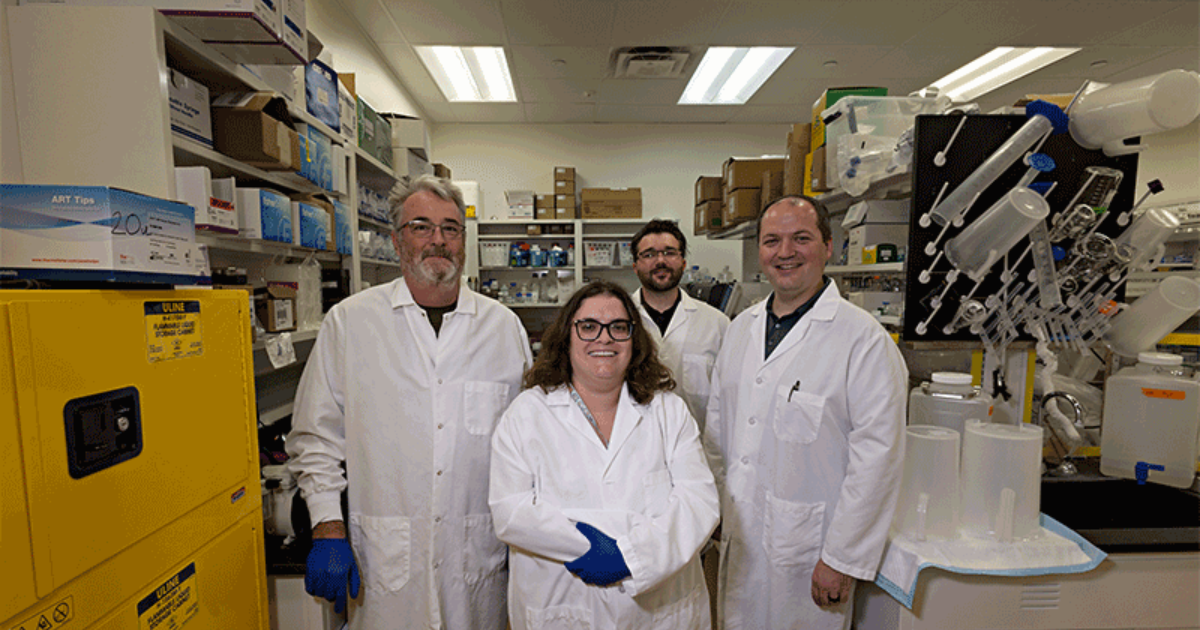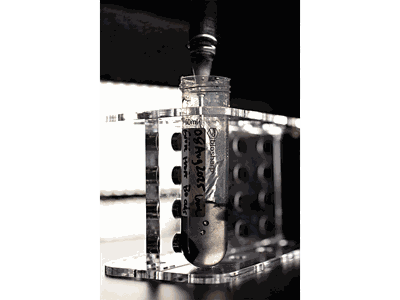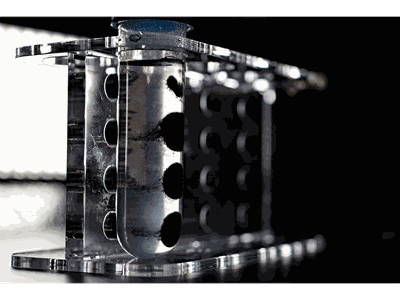
In Business Madison, September 2, 2025 - A scientist before his foray into business, Axio BioPharma co-founder Justin Byers found that promising drug concepts often faced daunting barriers to production at a large scale.
Now, his startup is working to maximize time- and cost-efficiency in Madison’s clinical manufacturing space.
The process of getting breakthrough drugs to pharmaceutical companies, and ultimately patients, in a reasonable time frame and at a palatable cost, is complicated, and Byers envisioned creating a more rapid and reliable approach.
As it develops artificial intelligence to inform manufacturing processes and ramp up the efficiency of clinical manufacturing, Axio BioPharma is working to attract investors and a strong client base.
Byers’ professional background prior to founding the startup helped him garner the insights and skills to differentiate Axio BioPharma in the clinical manufacturing world.
“I started off as one of the scientists at the bench doing analytical work,” he said. “I started in Middleton at PPD doing analytical services over there. Eventually, I made my way over to the development side. I was working with Illumina to develop their large-scale manufacturing processes. I absolutely loved it but wanted to get closer to clients.”
Shifting to the commercial sales side, Byers said he began to sell the services he used to perform as a scientist, and he recognized a key area of demand.
“Over the last decade … every client had the same thought and the same complaint, which is that it takes way too long to transition from great concept to clinical manufacturing, where you can really make that patient impact.
“It’s a multi-year journey, millions of dollars in development costs and no guarantee you’ll be successful. So clients have been demanding a better way, and that’s why I formed Axio.”
That meant, however, entering an arena that was very new to Byers at the time.
“I know the manufacturing, the development side, even the business side in this industry, but the AI was brand new to me,” he said.
Roughly six months participating in Y Combinator’s Co-founders Matching program led him to co-founder Brian Staats, who had over 20 years of experience in software engineering and was one of the original software engineers behind CrowdStrike and other well-known companies.
“He’s got that perfect AI and software engineering (background) as well as bioinformatics experience,” said Byers.
The two officially launched Axio BioPharma in August 2024. By November, the company took up residence at Forward Biolabs and brought on its first non-founding staff members, two scientists working in a shared lab space there.
While the company is a contract manufacturing organization, AI is a core facet of its operations. Unlike traditional development, which can be costly and time-consuming, Axio’s AI-driven process development helps predict large-scale clinical manufacturability to save time and money.
“In just a couple of hours, we can predict those processes,” Byers said. “It allows (our clients) very rapidly to get an accurate manufacturability assessment.”
Armed with this information, Axio can then help companies more efficiently carry out research-grade production.
“We’re doing the same manufacturing, at the same price point, with faster turnaround services right here in the United States,” Byers said, adding that the company in turn will use that manufacturing data to train its AI model, creating a cycle that improves the ability of AI to predict manufacturability, leading to even higher efficiency.
“When our clients are ready for the larger manufacturing at that clinical grade … they don’t have this big lag of multiple years until they can actually do it,” he said.



Launching a startup in an uncertain investment atmosphere presented an obstacle in Axio’s infancy. Both Byers and Staats had a small amount of funding to contribute when they launched, but Byers said it wasn’t nearly enough.
In “the startup scene right now, funds are being held onto very tightly. There’s a lot of capital out there, but not a lot of capital being deployed.
“We had to show value, show that customers want that value and highlight that to a lot of the investors out there. It took me reaching out, finding those angel investors, family offices and that’s where we had a lot of initial success.”
Some of these included Chisos Capital, a micro venture capital firm and Axio’s first investor, and Chemical Angel Network, which helped further propel the business.
“(Axio) pitched to us a couple months ago, and what we liked about the pitch was current revenue,” said Mark Vreeke, co-founder of Chemical Angel Network, based in Aliso Viejo, California. “It looked like they had a nice pipeline of prospects.
“There's a lot of companies doing AI today, but they were using AI to help develop their own process, and to provide a better service themselves. Rather than having that external AI implementation, they were using it internally to try to execute better in their space.”
In a relatively short amount of time, Axio has attracted investors and is in the midst of a $3 million funding round.
It also now employs roughly a dozen individuals on a full-time basis.
Demand in the clinical manufacturing sphere has provided a rich environment for the startup’s growth thus far, and Byers said the future looks promising.
“We’re excited by what we’re focused on today, which is specifically in the antibodies space,” he said. “However, our eyes kind of light up when we start thinking about the potential because we could continue to just keep expanding this into all different areas — whether that’s the gene editing space … cell therapy, MRNA. The list just goes on and on in all the different places we could apply this same technology.
“There’s also so many (companies) using AI to think about, what is the next new drug that we should be working on? They come up with hundreds of great ideas but have no way to actually manufacture them.”
Another point of pride, Byers said, lies in the numbers.
“Going from November, where we had absolutely zero in the pipeline, we’re now at about a $30 million sales pipeline,” he said. “We’re really excited by that. Our very next goal is, we’re working to bring on more automated equipment … to be able to process up to 3,000 proteins per week.”
He expects that jump to be feasible within just a few months.
“The potential is it could be quite impactful, especially when you think about precision medicines,” Byers said. “There’s been a lot of talk about rare and ultra-rare diseases, and how do we bring down drug costs so that we can actually effectively address some of these?
“This is one way that we’ll do that. If we can cut out months or years out of the development cycle, and millions of dollars, that’s just bringing down that drug price for that end user.”
This article was originally published by In Business Madison. Written by Brittney Kenaston.